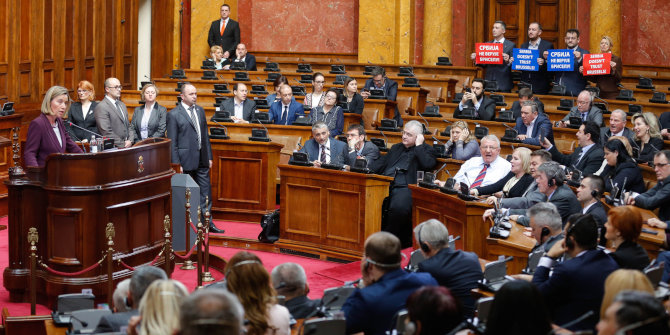 After almost a year of political deadlock, Mariano Rajoy has formed a new minority government in Spain, but how effective will this new government prove to be? Bonnie N. Field states that although previous minority governments have faced better governing conditions than the current one, the Rajoy government still has institutional advantages and some bargaining chips that it can use to its advantage.
After almost a year of political deadlock, Mariano Rajoy has formed a new minority government in Spain, but how effective will this new government prove to be? Bonnie N. Field states that although previous minority governments have faced better governing conditions than the current one, the Rajoy government still has institutional advantages and some bargaining chips that it can use to its advantage.
On 29 October, Spain’s parliament elected a new prime minister, incumbent Mariano Rajoy of the Popular Party (PP). Rajoy subsequently formed a single-party minority government, ending more than ten months of political stalemate. But a key question is how effective the new Rajoy government will be. Compared to its recent predecessors (see here), the Rajoy minority government is in a weaker partisan bargaining position. Nonetheless, it has institutional powers to set and control the political agenda, and faces a divided opposition and a Socialist Party that does not want elections anytime soon, which works to the government’s advantage.
Spain’s minority government
The 20 December 2015 elections altered Spain’s party system. The dominance of the centre-left Socialist Party (PSOE) and the conservative PP ended. The results produced a party system comprising four significant national parties, including newcomers Podemos and Ciudadanos (C’s), along with a variety of regionally-based parties. After failing to form a government, new elections took place in June 2016, producing broadly similar results.
Nearly four months later, parliament elected Rajoy in a second-round investiture vote in which the candidate needed more yes than no votes. One hundred and seventy members of parliament voted in favour of the candidate, 111 against, and 68 abstained. In addition to his own party’s MPs, Rajoy got the support of Ciudadanos and the single MP of the Canary Islands Coalition. Yet it was the abstention of most of the MPs of the Socialist Party that broke the deadlock.
Spain is no stranger to minority government, understood as a government that comprises ministers from one or more political parties who do not hold an absolute majority (50% + 1) of seats in the parliament. In fact, four of Spain’s prior six governments were minority ones, all of a single party, and Spain is amongst the European countries with the highest portion of minority governments.
With regard to its partisan bargaining position, the Rajoy government has the fewest seats in parliament of any of Spain’s minority governments since its transition to democracy in the mid-1970s. The Popular Party elected 137 MPs (39%) in the 350-seat Congress of Deputies, the more important chamber of parliament. This compares to between 156 (45%) and 169 (48%) seats for prior minority governments. The government has signed support agreements with Ciudadanos and the Canary Islands Coalition, which, if they endure, would give the government 170 votes, still short of an absolute majority of 176.
Nor do the party’s legislators occupy the median policy position in parliament. Calculated using data from the Chapel Hill Expert Survey of Party Positioning, on left-right ideological issues, the PP MPs are more to the right than the median MP. On centre-periphery territorial issues, critical to Spain’s party competition, the PP MPs are more centralist than the median MP. This is important because median parties may be better able to get what they want because they can negotiate with parties on the left or right, or with more centralist or pro-periphery parties.
Moreover, the Rajoy government does not face favourable governing dynamics in the decentralised regions of Spain. Prior minority governments were able to govern in part because they relied on the parliamentary support of small, regionally-based parties from Catalonia, the Basque Country and elsewhere that also needed political support to govern in their regions or govern more easily. Today, circumstances are quite different and regional parties’ support alone is insufficient.
The previously moderate Catalan nationalist party, whose support of minority governments was often critical, now wants independence from Spain, complicating interparty cooperation. And the corruption scandals plaguing the Popular Party make cooperating with it potentially risky for any party. Nonetheless, the government may be able to reach some agreements with the Basque Nationalist Party (PNV), which has five seats in the Spanish Congress, is governing in minority in the Basque Country, and has a history of expertly negotiating with Spain’s minority governments.
Bargaining chips for Rajoy
Despite being in a weaker position than prior minority governments, the government may not be as weak as it may seem at first glance. First, a dimmed spotlight may favour the government. Forming a government is one of the most visible political moments, a time when the press and the public pay attention to what parties do. In Spain, the investiture vote is also a public vote, where each MP’s name is called and she or he must verbally vote.
But day-to-day policymaking and governing is normally not as salient for the general public. Who does what in parliament can be opaque. For example, in Spain, rarely does parliament take a single vote on an entire piece of legislation; rather, votes are normally on articles and amendments, with no final vote required, except in the case of what are called Organic Laws. Roll call votes are rare. Once a quorum is reached, most legislation can be passed with more yes than no votes, meaning that if MPs are absent or abstain, it lowers the threshold for approval. In particular circumstances, parliamentary committees can pass laws, bypassing a more visible plenary debate. This opaque environment can help the government negotiate policy deals when parties are concerned about the electoral costs.
Second, all governments in Spain have advantages when it comes to putting items on the agenda and blocking those items that it does not want considered. To mention two significant powers, the government has the authority to block bills that alter the existing general budget, i.e. they increase government spending or decrease its receipts. The same is true of amendments to bills. Both limit what parliament can do.
Third, Spain’s government is more insulated from votes of no confidence. Its constructive vote of no confidence requires that an absolute majority of parliamentarians vote to remove the government and simultaneously agree on a new prime minister. The prime minister also, with some restrictions, controls the timing of elections within the maximum four-year span, which means he can use the threat of elections as a bargaining chip as long as opposition parties worry about their performance.
Fourth, the opposition parties are severely divided, complicating their ability to coordinate. Podemos and the PSOE are in a battle to be the lead party of the left, with Podemos doing better in the polls. Also, the PSOE, in particular, is severely internally divided. In early October, a sector of the party forced the resignation of Pedro Sánchez, the party leader, due to his refusal to facilitate a Rajoy government, and 15 MPs broke party discipline to vote against Rajoy’s investiture. In these circumstances, the PSOE wants time to regroup.
The relative weight of the factors that strengthen and weaken the government is difficult to calculate, making predictions risky. Generally, prior minority governments faced better governing conditions than the current one; nonetheless, the Rajoy government still has institutional advantages and some bargaining chips that it can use to its advantage.
Please read our comments policy before commenting.
Note: This article gives the views of the author, and not the position of EUROPP – European Politics and Policy, nor of the London School of Economics. Featured image credit: Jose Javier Martin Espartosa (CC-BY-SA-2.0)
Shortened URL for this post: http://bit.ly/2eXH2pk
_________________________________
 Bonnie N. Field – Bentley University
Bonnie N. Field – Bentley University
Bonnie N. Field is Professor of Global Studies at Bentley University and the author of Why Minority Governments Work: Multilevel Territorial Politics in Spain (Palgrave Macmillan 2016).





